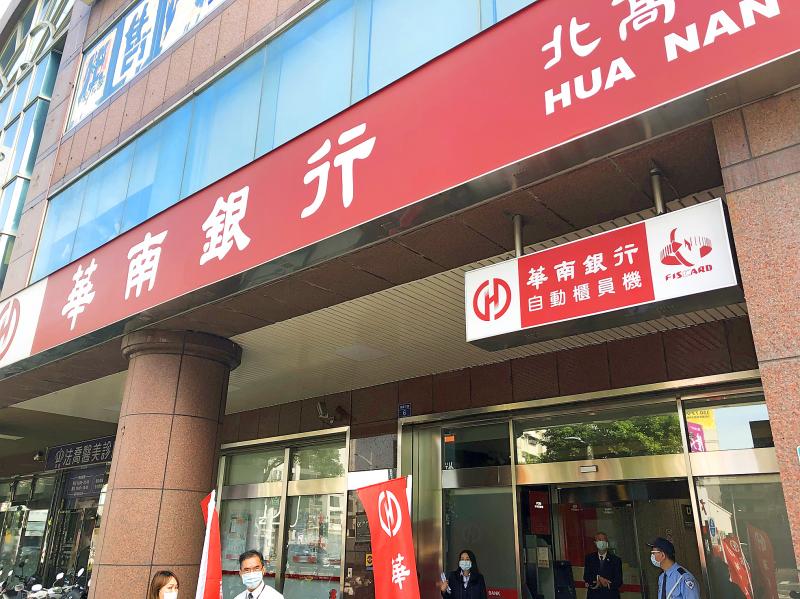State-run Hua Nan Commercial Bank (華南銀行) yesterday said that it is to recruit information technology personnel to meet development needs, as technology is reshaping the banking industry and it is stepping up digital transformation to stay competitive.
The century-old bank said it is in need of specialists in Java programming, software development, project management and systems integration training.
Nearly 70 percent of corporations have assigned more importance to information technology talent in the post-COVID-19 period, with the percentage reaching a high 86 percent among financial institutions, Hua Nan said, citing a survey of chief information officers by technology Web site iThome.

Photo: Kelson Wang, Taipei Times
Hua Nan welcomes jobseekers displaced or affected by the COVID-19 outbreak to join the company by following recruitment tips on its Web site and that of online recruitment agencies.
The lender’s information management business has three subdivisions that take charge of information security, information services, and information planning and development, it said.
New colleagues have the opportunity to sharpen their professional skills and knowhow on front-desk operations, back-
office efficiency enhancement, and cross-sectional coordination and integration, in line with their interests and strengths, it said.
To attract information technology talent, the lender said it has ditched its conventional seniority-focused promotion mechanism and replaced it with a system that values performance records and certificate accumulation.
Hua Nan said it has raised wages by at least 3 percent a year, with employees’ annual compensation averaging about 18.8 months of their monthly pay.

MULTIFACETED: A task force has analyzed possible scenarios and created responses to assist domestic industries in dealing with US tariffs, the economics minister said The Executive Yuan is tomorrow to announce countermeasures to US President Donald Trump’s planned reciprocal tariffs, although the details of the plan would not be made public until Monday next week, Minister of Economic Affairs J.W. Kuo (郭智輝) said yesterday. The Cabinet established an economic and trade task force in November last year to deal with US trade and tariff related issues, Kuo told reporters outside the legislature in Taipei. The task force has been analyzing and evaluating all kinds of scenarios to identify suitable responses and determine how best to assist domestic industries in managing the effects of Trump’s tariffs, he

TIGHT-LIPPED: UMC said it had no merger plans at the moment, after Nikkei Asia reported that the firm and GlobalFoundries were considering restarting merger talks United Microelectronics Corp (UMC, 聯電), the world’s No. 4 contract chipmaker, yesterday launched a new US$5 billion 12-inch chip factory in Singapore as part of its latest effort to diversify its manufacturing footprint amid growing geopolitical risks. The new factory, adjacent to UMC’s existing Singapore fab in the Pasir Res Wafer Fab Park, is scheduled to enter volume production next year, utilizing mature 22-nanometer and 28-nanometer process technologies, UMC said in a statement. The company plans to invest US$5 billion during the first phase of the new fab, which would have an installed capacity of 30,000 12-inch wafers per month, it said. The

Taiwan’s official purchasing managers’ index (PMI) last month rose 0.2 percentage points to 54.2, in a second consecutive month of expansion, thanks to front-loading demand intended to avoid potential US tariff hikes, the Chung-Hua Institution for Economic Research (CIER, 中華經濟研究院) said yesterday. While short-term demand appeared robust, uncertainties rose due to US President Donald Trump’s unpredictable trade policy, CIER president Lien Hsien-ming (連賢明) told a news conference in Taipei. Taiwan’s economy this year would be characterized by high-level fluctuations and the volatility would be wilder than most expect, Lien said Demand for electronics, particularly semiconductors, continues to benefit from US technology giants’ effort

‘SWASTICAR’: Tesla CEO Elon Musk’s close association with Donald Trump has prompted opponents to brand him a ‘Nazi’ and resulted in a dramatic drop in sales Demonstrators descended on Tesla Inc dealerships across the US, and in Europe and Canada on Saturday to protest company chief Elon Musk, who has amassed extraordinary power as a top adviser to US President Donald Trump. Waving signs with messages such as “Musk is stealing our money” and “Reclaim our country,” the protests largely took place peacefully following fiery episodes of vandalism on Tesla vehicles, dealerships and other facilities in recent weeks that US officials have denounced as terrorism. Hundreds rallied on Saturday outside the Tesla dealership in Manhattan. Some blasted Musk, the world’s richest man, while others demanded the shuttering of his